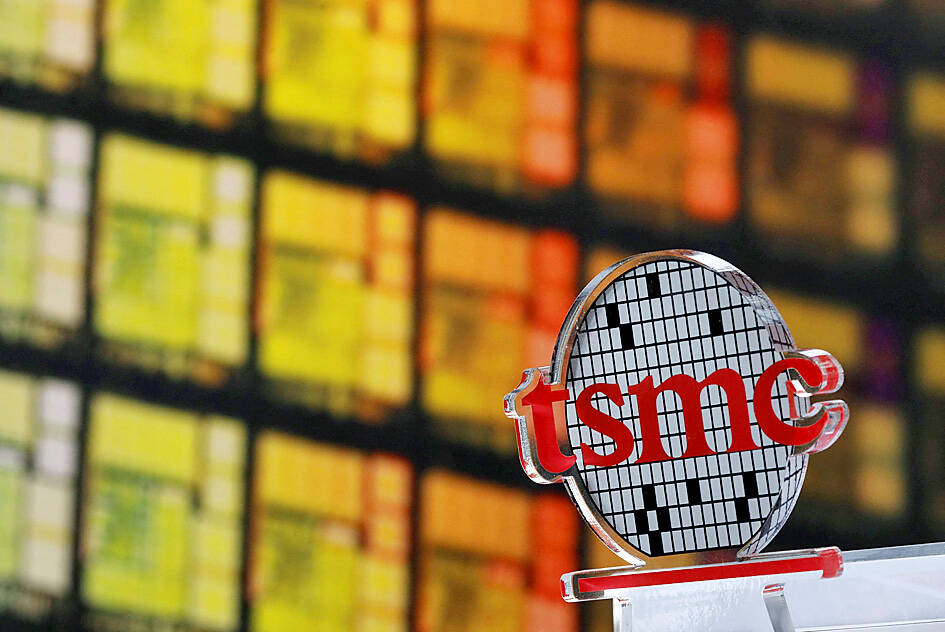Taiwan Semiconductor Manufacturing Co (TSMC, 台積電) retained the top spot among the largest companies in the Asian supply chain in terms of market capitalization, Digitimes Research said.
Citing its Asia Supply Chain Market Cap 100 rankings for last year, the research firm last week said TSMC’s market cap was US$378.45 billion, the highest among Asian suppliers, although it dropped by nearly US$200 billion during the year.
The 34.3 percent fall in TSMC’s market cap was the largest decline of any company in the survey last year, but was typical of how many top-ranking companies fared.

Photo: Tyrone Siu, REUTERS
The top 10 in Digitimes’ rankings all saw their market values tumble last year due to waning COVID-19-induced dividends, Russia’s invasion of Ukraine, COVID-19 lockdowns in China, rising interest rates and global inflation.
The combined market cap of the top 100 Asian suppliers was down 30.9 percent to US$3.3 trillion last year, and 90 percent of the top 100 companies experienced market cap falls during the year.
South Korea’s Samsung Electronics Co had the second-highest market cap of all suppliers at about US$262.8 billion, down 33.1 percent from a year earlier, ahead of Japan’s Toyota Motor Corp — US$225.72 billion in market cap, down 24.4 percent.
Next in order were China-based electric vehicle battery supplier Contemporary Amperex Technology Co (新能源科技) — US$139.29 billion, down 35.4 percent — and Japanese electronics brand Sony Group Corp — US$96.60 billion, down 39.1 percent — the survey showed.
Japan-based sensor, measuring system and laser maker Keyence Corp ranked sixth with a market cap of US$95.46 billion, down 37.5 percent year-on-year, followed by China’s electric vehicle company BYD Co (比亞迪) — US$94.65 billion, down 17.00 percent — and South Korea’s lithium-ion battery maker LG Energy Solution Ltd — US$81.12 billion, no comparison available — the results showed.
Rounding out the top 10 were Chinese home appliance supplier Midea Group Co (美的集團) — US$52.53 billion, down 35.2 percent — and Japanese machinery brand Hitachi Ltd — US$47.91 billion, down 8.5 percent — it said.
In addition to TSMC, five other Taiwanese companies were included in the top 100 list.
Among them, iPhone assembler Hon Hai Precision Industry Co (鴻海精密), the world’s largest contract electronics maker, also known as Foxconn Technology Group (富士康科技集團), took the 14th spot, rising from 21st place in 2021, Digitimes said.
It moved up despite a 13.5 percent year-on-year decline in market cap to US$45.07 billion, the survey showed.
A total of 52 Chinese companies were among the top 100 market cap list, the largest group in the region, ahead of Japan (26), South Korea (eight), Taiwan and India (six each), and Indonesia and Thailand (one each), Digitimes added.
By industry, 28 semiconductor companies were among the top 100 market cap list, the most of any industry, while 21 were in the automotive manufacturing industry, and there were 11 each in the machinery, tech products and equipment, and electrical component sectors, it said.
There were 10 in the electronic components sector, six in the consumer electronics field and two in the automotive component and equipment industry, the survey showed.

Macronix International Co (旺宏), the world’s biggest NOR flash memory supplier, yesterday said it would spend NT$22 billion (US$699.1 million) on capacity expansion this year to increase its production of mid-to-low-density memory chips as the world’s major memorychip suppliers are phasing out the market. The company said its planned capital expenditures are about 11 times higher than the NT$1.8 billion it spent on new facilities and equipment last year. A majority of this year’s outlay would be allocated to step up capacity of multi-level cell (MLC) NAND flash memory chips, which are used in embedded multimedia cards (eMMC), a managed

CULPRITS: Factors that affected the slip included falling global crude oil prices, wait-and-see consumer attitudes due to US tariffs and a different Lunar New Year holiday schedule Taiwan’s retail sales ended a nine-year growth streak last year, slipping 0.2 percent from a year earlier as uncertainty over US tariff policies affected demand for durable goods, data released on Friday by the Ministry of Economic Affairs showed. Last year’s retail sales totaled NT$4.84 trillion (US$153.27 billion), down about NT$9.5 billion, or 0.2 percent, from 2024. Despite the decline, the figure was still the second-highest annual sales total on record. Ministry statistics department deputy head Chen Yu-fang (陳玉芳) said sales of cars, motorcycles and related products, which accounted for 17.4 percent of total retail rales last year, fell NT$68.1 billion, or

In the wake of strong global demand for AI applications, Taiwan’s export-oriented economy accelerated with the composite index of economic indicators flashing the first “red” light in December for one year, indicating the economy is in booming mode, the National Development Council (NDC) said yesterday. Moreover, the index of leading indicators, which gauges the potential state of the economy over the next six months, also moved higher in December amid growing optimism over the outlook, the NDC said. In December, the index of economic indicators rose one point from a month earlier to 38, at the lower end of the “red” light.

The global server market is expected to grow 12.8 percent annually this year, with artificial intelligence (AI) servers projected to account for 16.5 percent, driven by continued investment in AI infrastructure by major cloud service providers (CSPs), market researcher TrendForce Corp (集邦科技) said yesterday. Global AI server shipments this year are expected to increase 28 percent year-on-year to more than 2.7 million units, driven by sustained demand from CSPs and government sovereign cloud projects, TrendForce analyst Frank Kung (龔明德) told the Taipei Times. Demand for GPU-based AI servers, including Nvidia Corp’s GB and Vera Rubin rack systems, is expected to remain high,